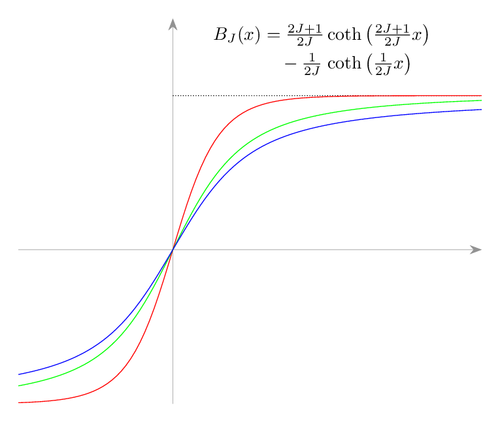The Brillouin function[1][2] is a special function, used for example in statistical mechanics.
It's plotting using standard TikZ, pgfplots is not required. The calculation is done using Lua, so LuaLaTeX has to be used for compiling.
This example was written by Mark Wibrow answering a question on TeX.SE, with modifications by Stefan Kottwitz (formula, scaling, styles for axis and plot).

Edit and compile if you like:
% Brillouin Function
% Author: Mark Wibrow
\documentclass[tikz,border=10pt]{standalone}
\usepackage{amsmath}
\usetikzlibrary{arrows.meta}
\directlua{
function coth (i)
return math.cosh(i) / math.sinh(i)
end
function brillouin (J, x)
if x == 0 then
return 0
else
return (2*J+1)/(2*J)*coth((2*J+1)/(2*J)*x) -
1/(2*J)*coth(1/(2*J)*x)
end
end
}
\pgfmathdeclarefunction{Brillouin}{2}{%
\edef\pgfmathresult{%
\directlua{tex.print("" .. brillouin(#1,#2))}%
}%
}
\begin{document}
\begin{tikzpicture}[
x = 2cm/10,
scale = 3,
axis/.style = {help lines, -{Stealth[length = 1.5ex]}},
brillouin/.style = {domain = -5:10, samples = 100}
]
\draw [axis] (-5,0) -- (10,0);
\draw [axis] (0,-1) -- (0,1.5);
\draw [densely dotted] (0,{ Brillouin(1, 100)} ) -- ++(10,0);
\draw [red] plot [brillouin] (\x, { Brillouin(1, \x)});
\draw [green] plot [brillouin] (\x, { Brillouin(5, \x)});
\draw [blue] plot [brillouin] (\x, { Brillouin(50, \x)});
\node [align = center, anchor = west] at (1,1.3) {%
$\begin{alignedat}{2}
B_J(x) &= \tfrac{2J + 1}{2J}
&&\coth \left ( \tfrac{2J + 1}{2J} x \right ) \\
&\quad - \tfrac{1}{2J}
&&\coth \left ( \tfrac{1}{2J} x \right )
\end{alignedat}$};
\end{tikzpicture}
\end{document}Click to download: brillouin-function.tex • brillouin-function.pdf
Open in Overleaf: brillouin-function.tex